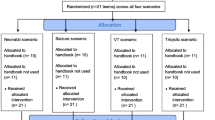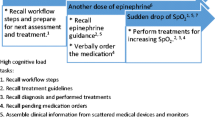Abstract
Cognitive aids have been shown to facilitate adherence to evidence-based guidelines and improve technical performance of teams when managing simulated critical events. Few studies have explored the effect of cognitive aids on non-technical skills, such as teamwork and communication. The current study sought to explore the effects of different decision support tools (DST), a type of cognitive aid, on the technical and non-technical performance of teams. The current study represents a randomized, blinded, control trial of the effects of three versions of an electronic DST on team performance during multiple simulations of perioperative emergencies. The DSTs included a version with only technical information, a version with only non-technical information and a version with both technical and non-technical information. The technical performance of teams was improved when they used the technical DST and the combined technical and non-technical DST when compared to memory alone. The technical performance of teams was significantly worse when using the non-technical DST. All three versions of the DST had a negligible effect on the non-technical performance of teams. The technical performance of teams in the current study was affected by different versions of a DST, yet there was no effect on the teams’ non-technical performance. The use of a DST, including those that focused on non-technical information, did not impact the non-technical performance of the teams.





Similar content being viewed by others
References
Flin, R., et al., Anaesthetists' non-technical skills. British journal of anaesthesia, 2010. 105(1): p. 38-44.
Abildgren, L., et al., The effectiveness of improving healthcare teams’ human factor skills using simulation-based training: a systematic review. Advances in Simulation, 2022. 7(1): p. 1-18.
Sherman, J.M., et al., Barriers to effective teamwork relating to pediatric resuscitations: perceptions of pediatric emergency medicine staff. Pediatric emergency care, 2020. 36(3): p. e146-e150.
Granchi, N., et al., Coaching to enhance qualified surgeons’ non-technical skills: a systematic review. British Journal of Surgery, 2021. 108(10): p. 1154-1161.
Merriel, A., et al., The effects of interactive training of healthcare providers on the management of life‐threatening emergencies in hospital. Cochrane Database of Systematic Reviews, 2019(9).
Lauridsen, K.G., V.M. Nadkarni, and R.A. Berg, Man and machine: can apps resuscitate medical performance? The Lancet. Child & adolescent health, 2019. 3(5): p. 282-283.
Corazza, F., et al., Development and usability of a novel interactive tablet APP (PediAppRREST) to support the management of pediatric cardiac arrest: pilot high-fidelity simulation-based study. JMIR mHealth and uHealth, 2020. 8(10): p. e19070.
McEvoy, M.D., et al., Adherence to guidelines for the management of local anesthetic systemic toxicity is improved by an electronic decision support tool and designated “Reader”. Regional Anesthesia & Pain Medicine, 2014. 39(4): p. 299-305.
Burden, A.R., et al., Does every code need a “reader?” improvement of rare event management with a cognitive aid “reader” during a simulated emergency: a pilot study. Simulation in Healthcare, 2012. 7(1): p. 1-9.
Marshall, S.D. and R. Mehra, The effects of a displayed cognitive aid on non‐technical skills in a simulated ‘can't intubate, can't oxygenate’crisis. Anaesthesia, 2014. 69(7): p. 669-677.
Dekker, A.D.B., et al., Testing the effects of checklists on team behaviour during emergencies on general wards: An observational study using high-fidelity simulation. Resuscitation, 2020. 157: p. 3-12.
Hardy, J.-B., et al., The use of a checklist improves anaesthesiologists’ technical and non-technical performance for simulated malignant hyperthermia management. Anaesthesia Critical Care & Pain Medicine, 2018. 37(1): p. 17-23.
Urman, R.D., et al., The effect of emergency manuals on team performance during two different simulated perioperative crises: a prospective, randomized controlled trial. Journal of Clinical Anesthesia, 2021. 68: p. 110080.
De Caen, A.R., et al., Part 12: pediatric advanced life support: 2015 American Heart Association guidelines update for cardiopulmonary resuscitation and emergency cardiovascular care. Circulation, 2015. 132(18_suppl_2): p. S526-S542.
Clebone, A., et al., The development and implementation of cognitive aids for critical events in pediatric anesthesia: the Society for Pediatric Anesthesia Critical Events Checklists. Anesthesia & Analgesia, 2017. 124(3): p. 900-907.
Steve Howard, L.C., Sara Goldhaber-Fiebert, David Gaba, Kyle Harrison. EMERGENCY MANUAL - COGNITIVE AIDS FOR PERIOPERATIVE CRITICAL EVENTS. 2016 [cited 2021 06/21/2021]; V3.1:[Available from: http://web.stanford.edu/dept/anesthesia/em/semv3.1_digital.pdf?_ga=2.219553945.1406350378.1501440567-576169366.1501440567.
Watkins, S.C., et al., Paper or plastic? Simulation based evaluation of two versions of a cognitive aid for managing pediatric peri-operative critical events by anesthesia trainees: evaluation of the society for pediatric anesthesia emergency checklist. Journal of clinical monitoring and computing, 2016. 30(3): p. 275-283.
McEvoy, M.D., et al., Validation of a detailed scoring checklist for use during advanced cardiac life support certification. Simul Healthc, 2012. 7(4): p. 222-35.
Watkins, S.C., et al., Assessment Tools for Use During Anesthesia-Centric Pediatric Advanced Life Support Training and Evaluation. Am J Med Sci, 2017. 353(6): p. 516-522.
Watkins, S.C., et al., Tools for Assessing the Performance of Pediatric Perioperative Teams During Simulated Crises: A Psychometric Analysis of Clinician Raters' Scores. Simulation in Healthcare, 2021. 16(1): p. 20-28.
Weinger, M.B., et al., This is not a test!: Misconceptions surrounding the maintenance of certification in anesthesiology simulation course. Anesthesiology, 2014. 121(3): p. 655-9.
Watkins, S.C., et al., Evaluation of a Simpler Tool to Assess Nontechnical Skills During Simulated Critical Events. Simulation in Healthcare, 2017. 12(2): p. 69-75.
Cooper, S., et al., Rating medical emergency teamwork performance: development of the Team Emergency Assessment Measure (TEAM). Resuscitation, 2010. 81(4): p. 446-52.
Cooper, S., et al., Measuring teamwork performance: Validity testing of the Team Emergency Assessment Measure (TEAM) with clinical resuscitation teams. Resuscitation, 2016. 101: p. 97-101.
Morris, P.E. and C.O. Fritz, Effect sizes in memory research. Memory, 2013. 21(7): p. 832-842.
Faul, F., et al., G* Power 3: A flexible statistical power analysis program for the social, behavioral, and biomedical sciences. Behavior research methods, 2007. 39(2): p. 175-191.
Neal, J.M., et al., ASRA checklist improves trainee performance during a simulated episode of local anesthetic systemic toxicity. Regional Anesthesia & Pain Medicine, 2012. 37(1): p. 8-15.
Siebert, J.N., et al., Effect of a mobile app on prehospital medication errors during simulated pediatric resuscitation: a randomized clinical trial. JAMA network open, 2021. 4(8): p. e2123007-e2123007.
Acknowledgements
The authors acknowledge the staff of the Center for Experiential Learning and Assessment (CELA) at Vanderbilt University School of Medicine for their contributions in developing, conducting and recording the simulated perioperative events.
Funding
Support for this study was provided by a research grant from the Anesthesia Patient Safety Foundation (01/2014 to 08/2015). The content is solely the responsibility of the authors and does not necessarily reflect the views of the Anesthesia Patient Safety Foundation.
Author information
Authors and Affiliations
Corresponding author
Ethics declarations
Conflict of interest
The authors declare no competing interests.
Additional information
Publisher's Note
Springer Nature remains neutral with regard to jurisdictional claims in published maps and institutional affiliations.
This article is part of the Topical Collection on Education & Training
Supplementary Information
Below is the link to the electronic supplementary material.
Rights and permissions
Springer Nature or its licensor holds exclusive rights to this article under a publishing agreement with the author(s) or other rightsholder(s); author self-archiving of the accepted manuscript version of this article is solely governed by the terms of such publishing agreement and applicable law.
About this article
Cite this article
Watkins, S.C., de Oliveira Filho, G.R., Furse, C.M. et al. The Effect of Novel Decision Support Tools on Technical and Non-Technical Performance of Teams in Managing Emergencies. J Med Syst 46, 75 (2022). https://doi.org/10.1007/s10916-022-01866-4
Received:
Accepted:
Published:
DOI: https://doi.org/10.1007/s10916-022-01866-4




